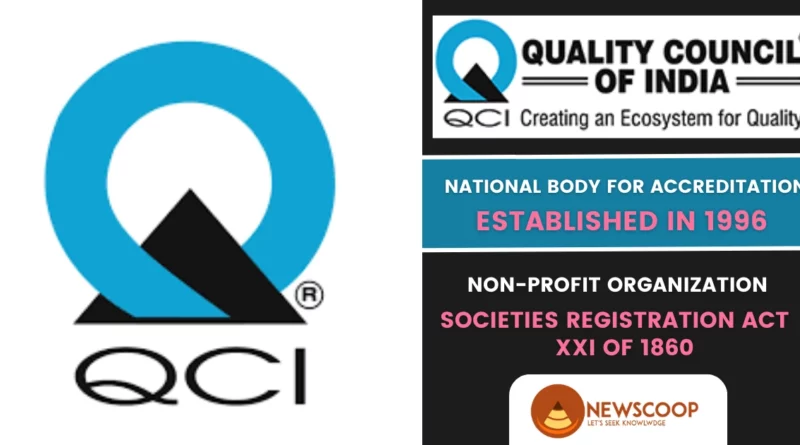Quality Council of India (QCI): Facts & Chairman
In this article, we will provide a brief overview of the Quality Council of India (QCI). Established in 1997, the QCI is a national body for Accreditation that promotes and establishes quality standards across various sectors in India. We will explore its objectives, initiatives, and achievements, highlighting its significant role in driving a culture of quality in the country.
Join us as we delve into the key aspects of the Quality Council of India and its impact on the nation’s pursuit of excellence.
| Name | Quality Council of India |
| Established in | 1997 |
| Total Members | 38 |
| Model | Public-Private Partnership |
| Type | Non-profit organization |
| Act | Societies Registration Act |
What is the Quality Council of India (QCI)?
The Quality Council of India (QCI) was established in 1997 as a national body for Accreditation. Its primary purpose is to promote and establish quality standards across various social and economic sectors. The QCI plays a crucial role in driving a culture of quality and adherence to standards, aiming to improve the overall quality of products, services, and processes in India.
Key Points about the Quality Council of India (QCI):
- QCI was established in 1997 as a National body for Accreditation.
- Its main objective is to establish and promote quality standards across all social and economic sectors.
- QCI operates as an independent autonomous organization through a Public-Private Partnership (PPP) model.
- It is supported by the Government of India and the three major industry associations: ASSOCHAM, CII, and FICCI.
- QCI is registered as a non-profit organization under the Societies Registration Act.
- The Department of Industrial Policy and Promotion, Ministry of Commerce and Industry serves as the nodal point for quality-related matters and helps in the implementation of QCI’s initiatives.
- QCI has launched the campaign ‘Gunvatta Se Atmanirbharta: India’s Quality Movement’ to celebrate India’s quality achievements and raise awareness about initiatives to improve the quality of life.
Composition
- The Quality Council of India (QCI) is governed by a Council with 38 members.
- The Council has equal representation from the government, industry, and consumers.
- The Chairman of QCI is appointed by the Prime Minister.
- The appointment is made based on the recommendation of the industry to the government.
History of Quality Council of India (QCI)
Since 1992, the need for a government-established accrediting agency to ensure global recognition of conformity assessment results has been recognized. Under the Ministry of Science & Technology, an accreditation body already operated for laboratories. To address this need, a committee was formed, consisting of representatives from various ministries, stakeholders, and industries. The committee’s purpose was to develop suitable recommendations for the establishment of such an agency.
The Department of Industrial Policy & Promotion (now known as the Department for Promotion of Industries and Internal Trade) played a crucial role in coordinating the committee’s efforts. In 1996, the recommendations were presented to the Cabinet. Among the key recommendations were the establishment of a joint organization by the government and the industry and the importance of ensuring the organization’s self-sustainability and independence from government control.
Accepting these recommendations, the Cabinet Committee decided to establish the Quality Council of India (QCI) as a non-profit autonomous society. The QCI was registered under the Societies Registration Act XXI of 1860. Its primary objective was to create an accreditation structure within the country and spearhead a quality movement in India through a National Quality Campaign.
The Mission of the Quality Council of India
The mission of the QCI aimed to lead a nationwide quality movement by engaging all stakeholders. It emphasized the importance of adhering to quality standards across all spheres of activities to promote and protect the interests of the nation and its citizens. The vision of the QCI was to create an ecosystem that fosters and promotes quality in all aspects of Indian society.
By providing a platform for accreditation and driving a quality-centric approach, the QCI sought to contribute to the overall improvement and development of various sectors in India.
Objectives of Quality Council of India
The objectives of the Quality Council of India (QCI) to achieve its mission are as follows:
Leading a nationwide quality movement: The QCI aims to spearhead a countrywide quality movement through the National Quality Campaign, raising awareness among citizens and empowering them to demand quality across all areas of activity.
Promoting and safeguarding well-being: The QCI encourages manufacturers, suppliers, and service providers to adopt and adhere to quality standards and tools, promoting the well-being of consumers and protecting their interests.
Capacity development for continuous quality improvement: The QCI endeavors to enhance capacities at the government, institutional, and enterprise levels to implement and institutionalize continuous quality improvement.
National Accreditation Programs: The QCI aims to develop, establish, and operate national accreditation programs based on relevant international standards and guidelines. These programs encompass certification of products, personnel, management systems, inspection testing, calibration, medical laboratories, proficiency testing providers, and test facilities.
Accreditation programs for service sectors: The QCI aims to develop and implement national accreditation programs for various service sectors, including education, healthcare, environment protection, governance, social sectors, infrastructure, vocational training, etc. These programs will be based on national and international standards and guidelines, and in cases where standards are lacking, the QCI will develop accreditation standards to support the programs.
Capacity building in regulation, conformity assessment, and accreditation: The QCI seeks to strengthen capacities in regulation, conformity assessment, and accreditation to overcome technical barriers to trade (TBT) and sanitary and phytosanitary (SPS) constraints.
International collaborations and linkages: The QCI aims to establish and maintain strong partnerships with international and regional organizations such as the International Laboratory Accreditation Cooperation (ILAC), International Accreditation Forum (IAF), Asia Pacific Laboratory Accreditation Cooperation (APLAC), Pacific Accreditation Cooperation (PAC), International Society for Quality in Healthcare (ISQua), and the Organization for Economic Cooperation and Development (OECD). This facilitates participation in plenary sessions, and committee meetings, and promotes mutual recognition arrangements.
Bilateral/Multilateral Recognition Arrangements: The QCI engages in activities to encourage bilateral and multilateral recognition arrangements between QCI/Constituent Boards and accreditation bodies in other countries.
Third-party assessment models: The QCI promotes the development and utilization of third-party assessment models for governments, regulators, organizations, and society.
Enhancing the competitiveness of enterprises: The QCI focuses on enhancing the quality competitiveness of Indian enterprises, particularly micro, small, and medium enterprises (MSMEs), by promoting the adoption and adherence to quality management standards and tools.
Establishment of quality improvement and benchmarking center: The QCI supports the establishment of a quality improvement and benchmarking center that serves as a repository of best international and national practices, facilitating their dissemination among industries in all sectors.
Research and dissemination: The QCI encourages industrial and applied research and development in the field of quality, disseminating research outcomes through relevant publications and trade journals.
Publication and information dissemination: The QCI publishes books, literature, and periodicals related to its objectives, playing an active role in disseminating information on standards and quality.
Participation in trade fairs and events: The QCI organizes and participates in trade fairs, exhibitions, seminars, and other events at national and international levels to promote quality standards and practices.
Accreditation mechanisms for emerging areas: The QCI aims to build capacities, including the development of appropriate quality accreditation mechanisms, to address emerging areas such as the food sector, oil, and gas, forestry, agriculture/animal husbandry, warehouse management, pharmacy, etc.
Appeal mechanism: The QCI develops and operates an appeal mechanism to handle unresolved complaints, ensuring a fair and transparent process for addressing concerns related to standards and quality.
Contribution
India’s Quality Council (QCI) has made significant contributions across various sectors, leading to transformative changes and improvements. Here are some key contributions:
- Transformation in the Coal Ecosystem: QCI brought about a shift in the coal industry’s perception of quality. Through initiatives like a third-party sampling of coal, QCI improved the quality consciousness within the entire coal ecosystem, resulting in a significant improvement in coal quality.
- Collaboration with Food Corporation of India (FCI): QCI collaborated with FCI to ensure better quality food grains reach consumers, particularly those from underprivileged backgrounds. Technological advancements, such as biometric-enabled distribution under the One Nation One Ration Card (ONORC) system, have improved the efficiency and quality of food grain distribution.
- One District One Product (ODOP) Initiative: QCI has played a crucial role in the ODOP initiative, which aims to promote products from remote areas and help them find markets in India and abroad. QCI’s contributions include supporting Geographical Indication (GI) tagging and completing the Swacch Surveykshan (Cleanliness Survey).
- Swachh Bharat Mission: QCI actively participated in the Swachh Bharat Mission, which aimed to improve sanitation and eliminate open defecation across India. As part of its role, QCI helped in measuring the number of toilets constructed under the mission. This involved conducting surveys and assessments to determine the progress made in toilet construction, ensuring transparency and accountability in meeting the program’s targets.
- PM Awas Yojana: QCI also contributed to the PM Awas Yojana, a housing scheme launched by the Indian government to provide affordable housing for all. QCI’s involvement included assessing the quality of electricity delivered in villages and houses constructed under the scheme. By conducting inspections and evaluations, QCI helped ensure that the electricity infrastructure and services met the required standards, enhancing the overall quality of life for beneficiaries.
- Ujjwala Yojana: QCI played a supervisory role in the Ujjwala Yojana, a scheme aimed at providing clean cooking fuel to households below the poverty line. QCI oversaw the delivery of gas cylinders to eligible beneficiaries, ensuring that the process was efficient, transparent, and reached the intended beneficiaries in a timely manner. By supervising the cylinder delivery, QCI contributed to the effective implementation of the Ujjwala Yojana and helped enhance access to clean cooking fuel for marginalized households.
These efforts by QCI have brought about positive changes, ensuring better quality standards, enhanced market access, and improved efficiency in various sectors. The council’s contributions have had a significant impact on promoting quality, fostering economic development, and benefitting both consumers and industries across India.
Conclusion
In conclusion, the Quality Council of India (QCI) stands as a pivotal institution in the country’s pursuit of excellence and quality across various sectors. Established in 1997 as a National body for Accreditation, the QCI has been instrumental in promoting and establishing quality standards in both social and economic domains.
Through its collaborative efforts with the government and industry associations, the QCI has played a crucial role in driving a culture of quality and ensuring adherence to standards. By offering accreditation programs and initiatives, the QCI aims to enhance the overall quality of products, services, and processes in India.
It’s non-profit status and autonomous nature underline its commitment to impartiality and fostering a fair and transparent quality ecosystem. As India progresses towards self-reliance and growth, the Quality Council of India continues to play a vital role in leading the nation’s quality movement, facilitating innovation, competitiveness, and the well-being of citizens.
Thank You!
FAQs
When was the Quality Council of India (QCI) established?
The Quality Council of India (QCI) was indeed established in 1997 through a Cabinet decision of the Government of India (GoI).
Quality Council of India comes under which Act?
The Quality Council of India (QCI) is indeed a non-profit organization registered under the Societies Registration Act XXI of 1860.

